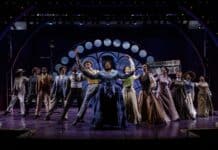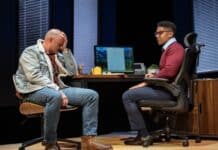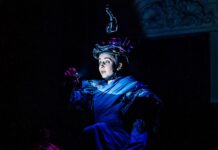Director Matt Reckeweg refers to We Happy Few’s production of Karel Čapek’s R.U.R. (Rossum’s Universal Robots) as “the original robot apocalypse story” and “[a] sci-fi melodrama before the genre existed.” It certainly is. Fans of the classic television series The Twilight Zone (1959 to 1964) or the science fiction movie Forbidden Planet (1956) will feel right at home. The Czech author Čapek (1890–1938) wrote short stories, novels, and essays, but he is best known for his plays, especially this one. R.U.R. (1921), which became famous around the world, takes place in The Future (as imagined in the early 1920s). The script contains implications regarding robotic technology and AI a century before their time.
At first, we see an island factory, with jagged frames suggesting towers and rows of chimneys. The Robots (Paige O’Malley, Andrew Quilpa, Shaquille Stewart, Scott Whalen, and Emilia Pazniokas) enter, stylishly attired in gray jumpsuits, and perform a kind of mechanical dance. They then furnish the office of R.U.R.’s general manager, who is dictating to his secretary.

Our heroine, Helena Glory (Made Key), enters, just off the boat, the idealistic daughter of one President Glory. Helena is here to visit Rossum’s Universal Robots and hopefully make some changes. She is met by the general manager, Domin (Matthew Sparacino), who is eager to show her the factory and introduce her to the wonders of the secret manufacture of artificial people, that is, robots. Their purpose is work.
DOMIN: [A] working machine must not play the piano, must not feel happy. To manufacture artificial workers is the same thing as the manufacture of a gasoline motor. The process must be the simplest, and the product the best from a practical point of view.
HELENA: What?
DOMIN: What sort of worker do you think is the best from a practical point of view?
HELENA: Oh! Perhaps the one who is most honest and hard-working.
DOMIN: No. The one that is the cheapest.
Sparancino as Domin has the hurried charm of a successful businessman. Despite his pragmatic ethos, he believes that his “living machines” will relieve mankind from “the degradation of labor.”
Made Key (Helena) finds exceptional complexity in their role. Their stylized approach suggests that the character’s idealism is something of a performance, but it is not. As they adhere to their principles despite every risk, their scenes become very moving.
Helena is introduced to Domin’s associates, Alquist (Andrew Quilpa), engineer and technical controller; Busman (Shaquille Stewart), head of finance; and Dr. Gall (Paige O’Malley), head of the experimental department.

Quilpa as Alquist believes that the use of robots, though economically rewarding, is morally repugnant. He alone is able to help the robots move forward when it seems all is lost. Stewart’s Consul Busman, the head of finance, focuses on profitability, although, for him, money is not the ultimate solution. O’Malley’s Dr. Gall decides to make the robots “more human,” which leads, predictably, to rebellion. All three perform skillfully, and each has a distinctive perspective on the robots and their purpose.
The robot Radius (Scott Whalen) becomes the leader of the revolt. Their compelling scene with Sulla (Emilia Paznokas) as both beg for their lives is one of the best in the production.
When R.U.R. was first produced, critics offered all kinds of interpretations of its significance and what the robots symbolized.
Čapek himself, in a 1923 article for The Saturday Review (London), had this to say:
A product of the human brain has at last escaped from the control of human hands. This is the comedy of science.
Now for my other idea, the comedy of truth. In the play, the factory director Domin establishes that technical progress emancipates man from hard manual labour, and he is quite right. The Tolstoyan Alquist, to the contrary, believes that technological progress demoralizes him, and I think he is quite right, too.
The script has been beautifully cut and freely adapted by the ensemble of artists. Director Matt Reckeweg has taken great care with every aspect of the production. Their set is elegantly designed and versatile. Costume design (Lee Gerstenhaber) is imaginative and offers just the right touch of futurism. Composer Amy K. Bormet’s music is exquisite.
Sound design is by Mike Winch, and lighting design is by Jason Aufdem-Brinke. All the technical effects are excellent.
The mystery of the robots anticipates the mystery of AI. What happens next is anyone’s guess.
Running Time: Two hours, with one 15-minute intermission.
November 12, 2024: Due to extenuating circumstances, the remainder of the run is canceled.
R.U.R. (Rossum’s Universal Robots) plays through November 16, 2024 (at 7 p.m. on Thursdays, Fridays, and Saturdays), presented by We Happy Few performing at Capitol Hill Arts Workshop, 545 7th St SE, Washington, DC. Tickets (from $10) and available online.
The program for R.U.R. is online here.
R.U.R. (Rossum’s Universal Robots)
Written by Karel Čapek
Based on the translation by Nigel Playfair and Paul Selver
Directed by Matt Reckeweg
CAST
Helena: Made Key
Domin: Matthew Sparacino
Dr. Gall: Paige O’Malley
Andrew Quilpa: Alquist
Busman: Shaquille Stewart
Radius: Scott Whalen
Sulla: Emilia Pazniokas
CREATIVE AND PRODUCTION STAFF
Artistic Director: Kerry McGee
Managing Director: Rachel Dixon
Produced by Kerry McGee
Production Management: Keith Hock
Set Design: Matt Reckeweg
Lighting Design: Jason Aufdem-Brinke
Assistant Lighting Design: Madi Wentelq
Technical Direction: Jaimee Fricklas
Costume Design: Lee Gerstenhaber
Sound Design: Mike Winch
Music Composer: Amy K Bormet
Dramaturgy: Keith Hock
Graphic Design: Todd Hilgert
Stage Management: Makenzi Wentela
Fight Choreography: Robert Pike
Intimacy Coordinator: Emily Sucher
Artistic Director: Kerry McGee
Managing Director: Rachel Dixon
Marketing Lead: Gabby Wolfe
Literary Director: Keith Hock
Bookkeeper: Conor Cahill
Box Office Manager: Keith Hock
Grant Writer: Reid Sharkey
SEE ALSO:
We Happy Few to present tech classic ‘Rossum’s Universal Robots’ (news story, September 19, 2024)



